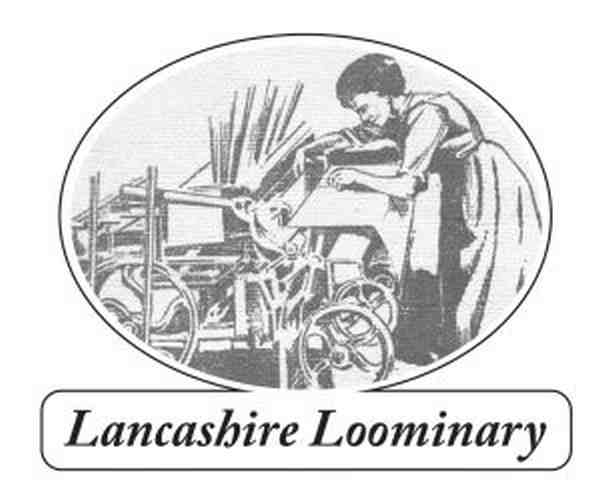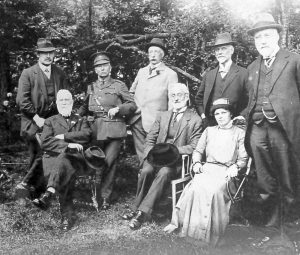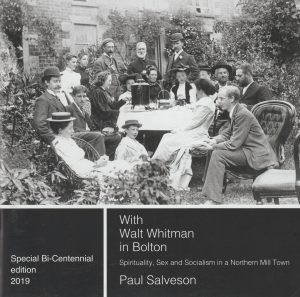 Imagine if…..
Imagine if…..
Walt Whitman didn’t actually come to Bolton. He never left the United States, and didn’t stray far from New York. Yet it feels like he came here, breathing in the Lancashire moorland air whilst striding up to Walker Fold and Rivington. To many of his friends and comrades whom he described as ‘those splendid Bolton fellows’, Whitman was there amongst them when they celebrated his birthday with readings, lilac and loving cups. Walt who? Perhaps not so well known in Britain but to millions of Americans he is their greatest poet. Read him and you’ll see why.
The great Bolton writer, Allen Clarke, said in 1919 that ‘it is fitting that Bolton should be distinguished above all towns in England by having a group of Whitman enthusiasts, for many years in close touch, by letter and visit, with ‘the Master’, for I am sure Walt Whitman, the singer of out-door life, would have loved to ramble our Lancashire moorlands.’ (published in book form in ‘Moorlands and Memories’, Bolton, 1920).
Why Bolton? Whitman, towards the end of his life, developed a friendship with a small group of enthusiasts in the town which was then at the heart of the Lancashire cotton industry. They called
themselves ‘The Eagle Street College’ after the modest two-up two-down terraced house where the group’s mentor, J.W. Wallace, lived with his parents in the mid-1880s. It all started with a birthday greeting sent to Whitman in1887, signed by Wallace and his friend Dr John Johnston.
The group were, at least initially, mainly lower middle-class men who included clerks, a journalist, clergymen and one or two skilled workers. They were not a metropolitan intelligentsia, but neither could they be described as representative of Bolton’s industrial working class. They
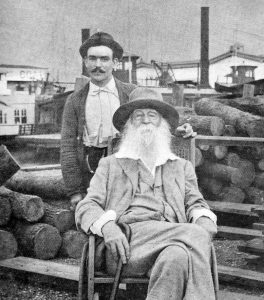
were probably typical of the sort of person drawn to the young Independent Labour Party with its message of ethical, rather than Marxian, socialism. As Fred Wild, an early member of the group commented ‘these young men were all from the Parish Church and for the most part were engaged as clerks or minor gaffers and were attracted to Wallace by his personality and intellectual powers.’
The story of the group casts light on the genesis of English socialism and shows the powerful influence Whitman exerted on North of England radicalism in the early 1890s, much of which was down to the tireless proselytising of Wallace. By the beginning of the twentieth century Bolton was at the heart of an informal network of British and Irish Whitman admirers which included Keir Hardie, Robert Blatchford, Edward Carpenter, AE (George Russell) and John Addington Symonds. It extended to include some of the leading figures on the American left – including Horace Traubel, J. W. Lloyd and Leonard D. Abbott. The ‘outer periphery’ included railroad union leader Eugene Debs and the mother of 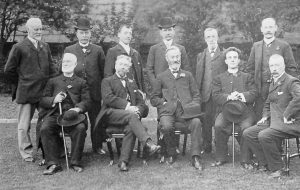 American anarchism, Emma Goldman.
American anarchism, Emma Goldman.
The heady mix of socialism, sexuality, mysticism and love of ‘the open air’ which Carpenter personified was far from being the preserve just of well-known upper class radicals and the Bolton group took all of these themes to its heart.
My With Walt Whitman in Bolton: spirituality, sex and socialism in a Northern mill town was re-published in 2019 to mark the bi-centenary of Whitman’s birth. It usually costs £10.00 but is available for a limited time at £6.00. Postage is extra at £3 but free local delivery around Bolton is available courtesy of the Bolton Bicycling Bookshop. Enquire for overseas postage rates.
The annual Whitman Walk for 2022 will take place on Saturday May 28th, starting at 14.00 from the bus terminus at Barrowbridge (bus leaves Bolton Interchange at 13.20)
